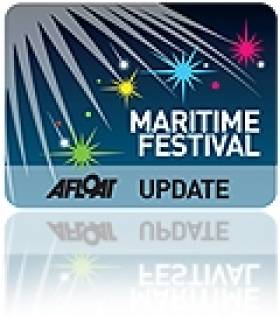Displaying items by tag: RTE TV
'Ireland's Ocean' is a major new four part ocean wildlife series for RTÉ One exploring the wonderful and diverse creatures that live in the seas around Ireland, from dolphins and sharks to plankton and the myriad of tiny colourful creatures that live in our shallow waters.
The series looks at the history of man's relationship with and response to the sea in Ireland, examining the common perception of creatures like dolphins and sharks ... are dolphins highly intelligent, sensitive creatures capable of healing sick children? Why are worrying numbers of dolphins washing up dead on our Atlantic coast? Are sharks terrifying animals waiting below the sea surface to eat us?
The truth transpires to be quite a surprise and leaves us with considerable food for thought. In other areas, the series takes us on a journey into wild and the colourful underwater world in the seas around Ireland, encountering an abundance of exotic creatures, many documented for the first time in this area.
Throughout the programmes, there is a strong sense of the interconnectedness of life, and natural balance within this world, as creatures depend on each other's presence to sustain life.
The first programme this Sunday takes a look at some of the 27,000 common dolphins living in Irish waters with scientists Dr Joanne O'Brien and Dr Simon Berrow.
The second programme, Sunday 29th June at 6.30pm gets up close with some of the 40 shark species and 30 ray species that live in Irish waters with Dr Maurice Clarke at the Marine Institute, as well as following the conservation efforts of Dr. Edward Farrell, Irish Elasmobranch Group, placing satellite tags on porbeagle sharks off Donegal, in a Marine Institute research programme.
Programme three focuses on life in the shallow seas around Ireland which are some of the most fertile on Earth. Storms churn up nutrients from the sea floor which combine with sunlight to create a fertile and abundant ecosystem.
The final programme looks at Ireland's ocean habitats.
Ireland's Ocean begins on Sunday June 22nd at 6:30pm on RTÉ One and runs for four weeks.
'Ireland's Ocean' was produced by Sea Fever Productions for RTÉ and financed under the Broadcasting Authority of Ireland's Sound & Vision scheme, and also by the Environmental Protection Agency.
Boats Head for 'Foyle Days' 2011
Over the years she has changed hands between Dutch and UK interests for recreational use. Several years ago she starred in the RTE TV reality show 'Cabin Fever' where she replaced the show's first ship Camaret of Cornwall (branded as 'Cabin Fever') after it ran aground off Tory Island.
During the two-day festival (11am-5pm) the boating community at the event will include the Coleraine Yacht Club, Foyle Paddlers, Foyle Punts, Lough Foyle Yacht Club, Lough Swilly Yacht Club, Moville Boat Club, RNLI and the Foyle (SAR) Search and Rescue.
Visitors to Foyle Days can call to the Clipper stand and learn more about the city's entry of the Derry~Londonderry boat in the 2011-2012 Clipper Round the World Race. Learn more about the countries the crew will visit and also how to get involved in the event. For more information about the race, at 40,000 miles is the world's longest race go to www.clipperroundtheworld.com/
Running alongside the festival a continental market with 40 stalls will be open to all at the recently revamped Guildhall Square. For further details about Foyle Days click here.
- Clipper Race
- Maritime Festival
- RNLI
- Lough Foyle Yacht Club
- Lough Swilly Yacht Club
- Moville Boat Club
- Derry
- Londonderry
- Tory Island
- JOHANNA LUCRETIA
- Foyle Days
- RTE TV
- Cabin Fever
- Camaret of Cornwall
- Grounding
- Reality TV show
- Clipper Around the World Race
- Guildhall Square
- Continental Market
- Coleraine Yacht Club
- Foyle Search and Rescue
- Foyle Paddlers
- Foyle Punts
- Offshore Sailing
- Clipper Round The World Race
- JOHANNA LUCRETIA

























































